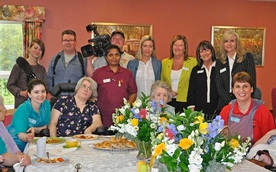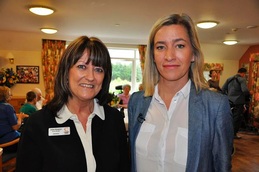Don't stay silent about dementia, urge Awareness Week campaigners
Dementia Awareness Week 19-25 May, was used by campaigners to highlight the importance of discussing mental health-related concerns with loved ones and health professionals.

Promoting their theme of 'worrying changes nothing, talking changes everything', the Alzheimer’s Society asked YouGov to conduct a survey asking how adults would respond to dementia, finding that close to half of adults admit to a dilemma in whether or not to bring up the matter with their family.
Responses to the survey also showed that adults aged over 55 are more likely to find the subject difficult, showing a growth in anxiety as people enter the demographic most likely to encounter dementia in its many forms.
The Alzheimer’s Society estimates this could mean up to half a million people are worrying in silence.
Mike Howorth, from Cheshire, who is diagnosed with dementia, comments on his own experience, saying:
“I was diagnosed with dementia six years ago. My father and grandmother had the condition so as soon as I noticed I was repeating myself and starting to forget things I went straight to my GP. I tell everyone I meet that I have dementia. It is absolutely vital that we talk about the condition. Unless people are prepared to talk about it many of those who are worried about their memories will never pluck up the courage to see their GP.
“I still do all the things I love such as playing golf, working in the garden, swimming and playing bridge. I also do some part time work helping others who have been diagnosed with dementia. I want to stress the importance of talking about the condition. It really will make a huge difference.”
Qualified dementia carer, Mary Jordan, writes in ‘The Essential Guide to Avoiding Dementia’ – published this year by Hammersmith Health Books – that dementia is ‘the ultimate “politically correct” disease’.
She explains: ‘It can strike whether you are rich or poor, dark or fair, religious or atheist, a nuclear scientist or a road sweeper, a man or a woman, obese or underweight. Current research indicates that age is the biggest risk factor for dementia – and mostly we have to grow old.’
On her experience of writing the book, which explores the findings of key research to advise how the risk of developing dementia can be reduced, Ms Jordan comments, “The thing that struck me the most when writing this book was the amount of evidence in research that revealed how key social interaction is and what a high risk a solitary lifestyle is. It seems very much connected with brain plasticity – keeping on learning, stretching the mind, meeting new situations and interacting with others.”
Cognitive neuroscientist and ageing specialist Dr Lynda Shaw wants to see a more open approach to dementia within both family and community life, as a means of fighting against the isolation of individuals who have to live with memory loss.

Dr Shaw comments: “Not long ago three or even four generations would sit round the table eating and chatting. Neighbours would appear invited or not, the door was never locked. Times have changed, but we haven’t. We still need to feel we belong to a group of people and we still need company. Isolation kills and it kills slowly and it also exacerbates dementia.”
She continues: “Research has shown that positive social support stimulates brain chemicals, such as the neuropeptide oxytocin. Oxytocin is associated with social bonding and trust. It also moderates the impact of the stress hormone cortisol, which means that belonging to a community can not only alleviate stress, but can also help depression and anxiety disorder.
“Chronic social isolation stress has been shown to disrupt the normal function of the hippocampus, this part of the brain is critical for certain types of memory and emotional behaviours. It follows that, if a part of the brain associated with memory is hampered by isolation, this in turn will increase the severity of dementia.”
Alzheimer’s Society chief executive Jeremy Hughes comments: “It is really saddening that dementia is still a disease that many of us don’t feel comfortable talking about, especially with our own families. One in three people over 65 will develop dementia in the UK and hundreds of thousands more are affected by the condition in some way, whether it is a family member or a friend.
“We want people to start talking about dementia. It is not just about preparing us all for a condition that is on the rise and currently incurable. It is about banishing the stigma surrounding dementia that is causing so many people to struggle in silence.”

Appearing on ITV daybreak, Colten Care Ltd’s operations manager June Gallagher gave her support to the Dementia Awareness objectives, many of which were behind the development of the care provider’s Practice Development Unit (PDU), in Fernhill, which focuses on interdisciplinary working and holistic care.
Ms Gallagher said: “We fully endorse the advice for people to talk more about dementia. If they are worried about a relative who may be showing the first signs, they should have the confidence to know they can seek help and talk about it. When it comes to actually giving care, again it’s about listening to people, talking with them about their individual needs and responding accordingly. This is a key element of our own dementia care education programme for all team members, not only carers but anyone who is involved in looking after our residents.”
Swindon-based home care provider, Bluebird Care, have welcomed Dementia Awareness Week with the appointment of their own Dementia Friends Champion.

Chris Simpson (pictured left), who is also a Care Ambassador for Skills for Care, comments: “I’ve had a long career in care and am passionate about both dementia care and quality training. As a Care Ambassador I get to go into places like schools to explain what caring involves. As a Dementia Friends Champion I can also help to raise awareness of the condition so people have a greater understanding of what it means and how to help people with the illness.”
Dr Lynda Shaw advises a proactive approach to the illness, saying: “As Dementia worsens this will obviously mean a lot of changes in life, and what the sufferer can cope with will undoubtedly change over time. Try varying activities to find what works and what doesn’t, and tailor things to an appropriate level of ability so the person doesn’t get frustrated. The community, the family and friends are vital to supporting a dementia sufferer from quickly worsening. Don’t leave them alone all day; just going over for an hour for a chat could make all the difference in the world to them.”
Star of hit film 'The Great Gatsby', Carey Mulligan, was among those celebrities supporting Dementia Awareness Week, along with author Terry Pratchett and TV actress Ruth Jones.
Latest News Analysis
 04-Sep-19
Extra £1.5 billion announced for social care in Chancellor's Spending Review
04-Sep-19
Extra £1.5 billion announced for social care in Chancellor's Spending Review
 02-Jul-19
Department of Health forced to rethink care homes' nursing rates after legal challenge
02-Jul-19
Department of Health forced to rethink care homes' nursing rates after legal challenge
 18-Jun-19
Overnight care workers forced to sleep in offices and told 'bring your own bedding'
18-Jun-19
Overnight care workers forced to sleep in offices and told 'bring your own bedding'
 14-Jun-19
Back in the closet: Third of care home staff have had no LGBT+ awareness training
14-Jun-19
Back in the closet: Third of care home staff have had no LGBT+ awareness training
 11-Jun-19
PM candidates on social care: Rory Stewart calls fixing care an 'unfinished revolution'
11-Jun-19
PM candidates on social care: Rory Stewart calls fixing care an 'unfinished revolution'